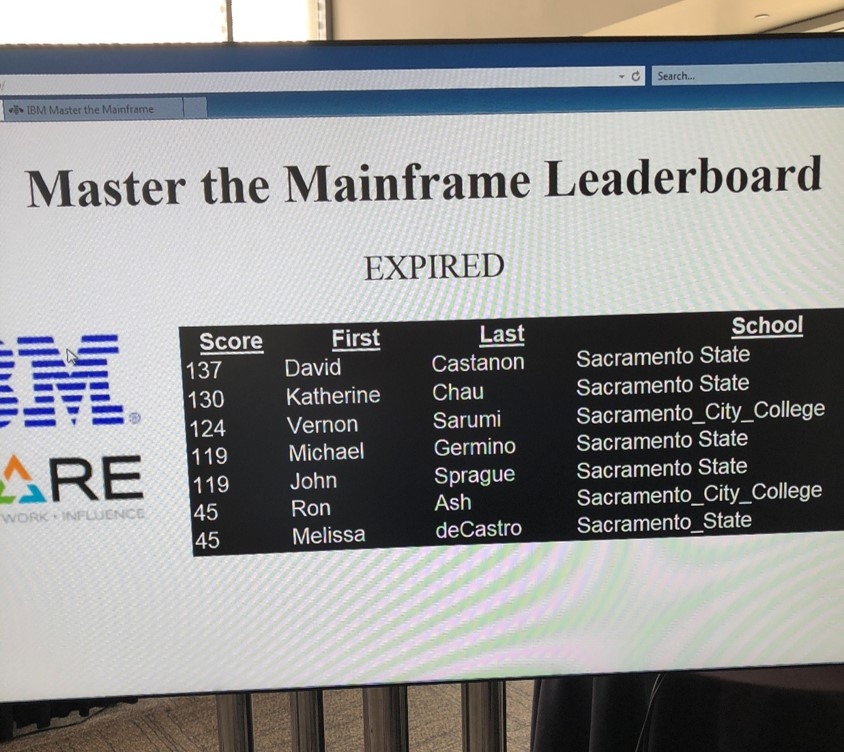Talk to any young mainframe professional and you will hear a familiar story: The biggest barrier preventing college graduates from pursuing a career in mainframe is simply awareness. Misty Decker would agree.
As Program Manager for the IBM Z Academic Initiative and the new organizer of Student Career Day at SHARE conferences, Decker said that once students find themselves learning about and interacting with the mainframe, it’s easy for them to see the possibilities of a career in the industry.
“Students love this stuff, they just don’t have a chance to see it,” she said.
Decker ran her first Student Career Day at this past spring’s SHARE Sacramento, and she found that the one-day event benefited not only the students in attendance, but also the lifelong mainframe professionals who were there to share knowledge and describe what it’s like to work in mainframes.
“The mainframers really benefited from seeing the students and how excited they were to learn this technology, despite conventional wisdom,” Decker explained.
Many college professors also attended Student Career Day, and the benefit for them was learning which types of technologies and skills they should be teaching in computer science classes. “I had a professor who came away very excited about the mainframe and ready to teach it in their classroom. It was a tremendous event for the entire mainframe ecosystem.”
Student Career Day included a full day of practical education and networking opportunities for aspiring IT professionals. Students started the day with the IBM Master the Mainframe hackathon, which offers an introduction to mainframe concepts and programming through competitive challenges.
The full hackathon includes dozens of challenges across three parts; students at SHARE Sacramento received a “sample” of the full program, Decker said. Participants were asked to complete a range of challenges designed to make mainframe education fun and unique – for example, one challenge involved using an ISPF macro to create an image of The Simpsons. Participants earned points along the way – a live leaderboard tracked the contest (see photo, below) – and winners were awarded prizes.

“It made for an exciting time. There are things people in the industry assume students are not interested in or that it’s too hard and that they’d rather have an environment that’s easier to work in,” Decker said, “And we found that students actually really enjoy mainframe, and the people at SHARE were able to see that firsthand.”
Several participants agreed. First place winner David Castanon from Sacramento State said, “Being able to participate in this event was a great opportunity for me to work on such an important technology. As a student entering the workforce, it makes me more marketable and opens up new opportunities for me as I pursue my career path.”
Fellow Sacramento State student Katherine Chau took home second place honors. To her, the idea of working on the mainframe seemed very intimidating at first, but what she found to be the reality once she rolled up her sleeves on that day was much different. “This experience definitely has me interested in pursuing work with mainframe computing in the future,” said Chau.
Local SHARE volunteer Ray Mullins visited Student Career Day while it was in progress, and was pleased to see the attendance, especially from his alma mater (Business-MIS, 2013). "I was very pleased to see students taking time out of midterm week to come and see the power and flexibility of the modern mainframe", he said. "I had posted on the Management Information Systems Association (MISA) board a couple of weeks earlier announcing that SHARE was in town, and I was glad to see positive results. During my years, only one instructor mentioned the mainframe regularly in his classes (he has worked on IBM Z; his first exposure was in, interestingly, UNIX System Services), and he used me as a resource to inform him and my fellow students about what was current at the time. My fellow students, especially those working for the State of California, would also ask me about the platform, and I would obligingly talk about it, and give them advice."
Student Career Day also included an employer panel, where representatives from various companies explained career opportunities in their companies. Students also had opportunities to network, meeting with SHARE premier sponsors, IBM developers and Z champions.
As successful as it was, Decker said she wants ensure the benefits of Student Career Day extend beyond SHARE events. She’s currently working to organize a guest lecture series through IBM’s Z Advocacy Hub, in which current mainframe professionals can volunteer to visit classrooms and talk to students about their careers in-person. That speaks to what Decker believes is the biggest benefit of events like Student Career Day: the chance to show young IT professionals exactly what a job in mainframe is all about.
“Students aren’t going to register for an event they’ve never heard of before. We really rely on the mainframe community to help spread the word,” she explained. “The most powerful recruiting tool is when mainframe professionals go into classrooms and explain what the mainframe is to the next generation. We found that when we tell students what this is all about, they line right up for events like Student Career Day.” d
Third place winner Vernon Sarumi of Sacramento City College, sums up what an event like Student Career Day can do to help spark interest where little existed for individuals prior. He said, “I can honestly say that prior to today I had never considered what it would be like to work on the mainframe. But this experience sparked my interest and I believe broadened my horizons going forward.”
Misty Decker is organizing the next Student Career Day at SHARE St. Louis, August 12-17.